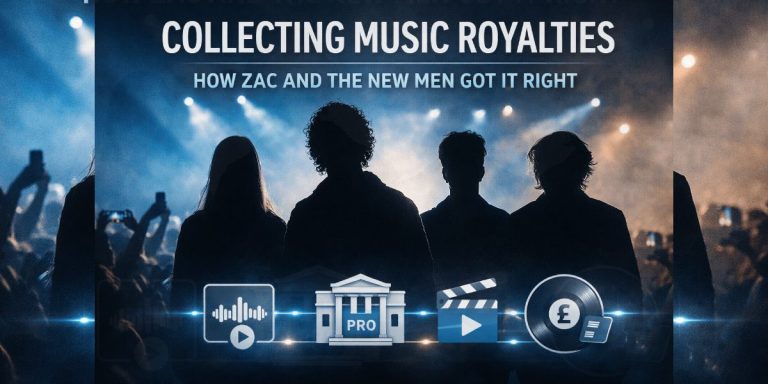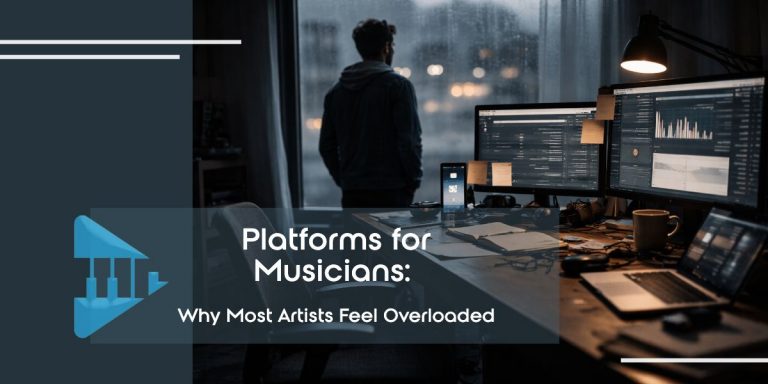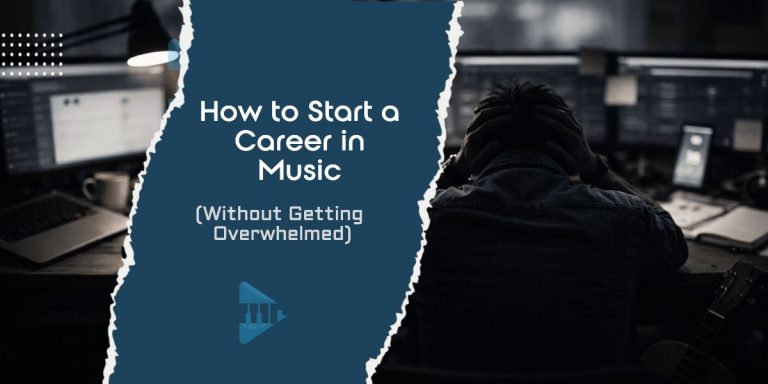Table of Contents
ToggleTL;DR Quick Answer:
You start a music career by doing three things from day one:
- Get your skills and sound tight. Practice, record, refine.
Set up your business foundations. Rights registered, metadata in order, basic studio and online presence ready. - Create early income streams. Live gigs, direct-to-fan sales, and sync opportunities.
Skip the admin and you leave money on the table.
Follow the right steps and you can be earning, protected, and building momentum in your first 90 days.
How to Start a Career as a Musician in 2025: The Real First Steps
Forget the overnight success myth.
Starting a music career is about stacking the right moves from day one so every track you make has a shot at being heard, protected, and paid for.
If you want the quick start:
Day one priorities:
- Get your sound tight. Play, record, refine.
- Lock your rights. Register songs, tag your files, keep your metadata clean.
- Build early income. Gigs, direct sales, sync – do not wait for streaming pennies.
Skip the business side and you will leak money before you even know it is missing.
Get it right early, and you can be earning, protected, and building momentum in your first 90 days.
Why This Guide is Different
The music industry does not just lose talent. It loses royalties.
Every day, incredible songs disappear into the noise because no one set up the systems to track them.
Composer and producer Bobby Cole saw it happen over and over during his decades in TV, film, ads, games, and stock platforms.
Artists would pour their soul into a track, release it, maybe even land a placement, and still never see the money. Why?
- Rights never registered.
- Metadata broken.
- Royalties sent to the wrong person.
That pain is what drove the creation of Melody Rights.
Not another faceless distributor. Not a sync library.
A system built to lock every right, tag every track, and make sure the royalties actually find you.
This guide takes the hard lessons learned in the industry and turns them into a clear plan.
By the end, you will know how to protect your work, prepare it for release, and build income streams that last from your very first song onward.
The Three Pillars of How to Start a Career as a Musician
When you strip away the noise, building a music career comes down to three pillars.
1. Your Craft
Without strong skills and a sound that is recognisably yours, the rest will not stick. That means daily practice, recording yourself often, and shaping your style until people know it is you within a few bars.
2. Your Infrastructure
A clear online presence matters. People should be able to find you, hear you, and understand what you are about without hunting. Alongside that, protect your work from the start so you can track every use and collect every payment yourself.
3. Your Income Plan
When it comes to income, do not pin all your hopes on streaming. That road is long and slow. Mix it up instead. Play live. Sell direct to fans.
Look at sync licensing, session gigs, even teaching if it fits. The more ways you can earn, the more stable you will be when one stream runs dry.
Get these three right from the start and you are not just making music. You are building something that lasts.
Week 1-4: Build Your Base (First Moves in Starting a Career as a Musician)
These first weeks are about habits and foundation. Small daily actions now will carry your career later.
Play every day
If all you have is a cheap guitar and a cracked version of GarageBand, that is fine. The important thing is to start playing and recording now. Some days it might be ten minutes, others a few hours. The habit matters more than the clock.
Pick your socials
Choose one or two platforms you can stand to open.
Clean up your profiles so people know who you are and where to hear your music. Post moments from your process – a riff you just came up with, a sound experiment, or a raw clip from practice. Perfection can wait. Connection cannot.
Protect your work
Sign up with a PRO so your songs have somewhere to send royalties. Register what you already have. Keep your lyric sheets, demos, and half-finished ideas in a place you will actually find again.
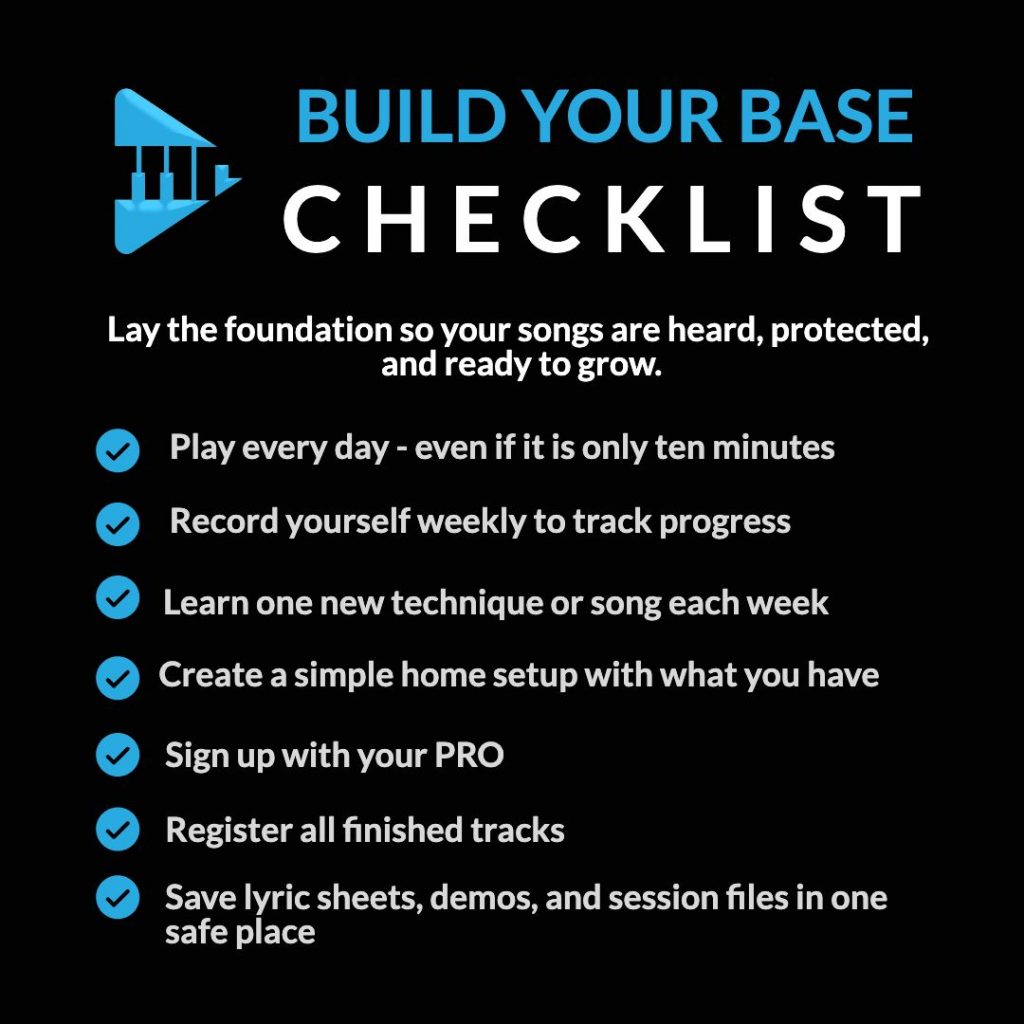
Week 5-8: Get Your Music Ready for Release
This stage is about finishing a track that represents you and preparing it for every opportunity.
Finish your first single
Record until it feels right, not just “done.” Play it for someone who will give you honest feedback, even if it stings.
Sort your cover art early
It does not need to be fancy, but it should match the mood of the song.
Make multiple versions
Have your main mix, an instrumental, and a clean edit ready. You will thank yourself when an opportunity comes up.
Tag your music
Metadata and ISRC codes are how royalties find you. Start a short list of places to share your music later – a couple of blogs, a playlist or two, or an online community where your style fits.
Here’s your release-ready action plan:
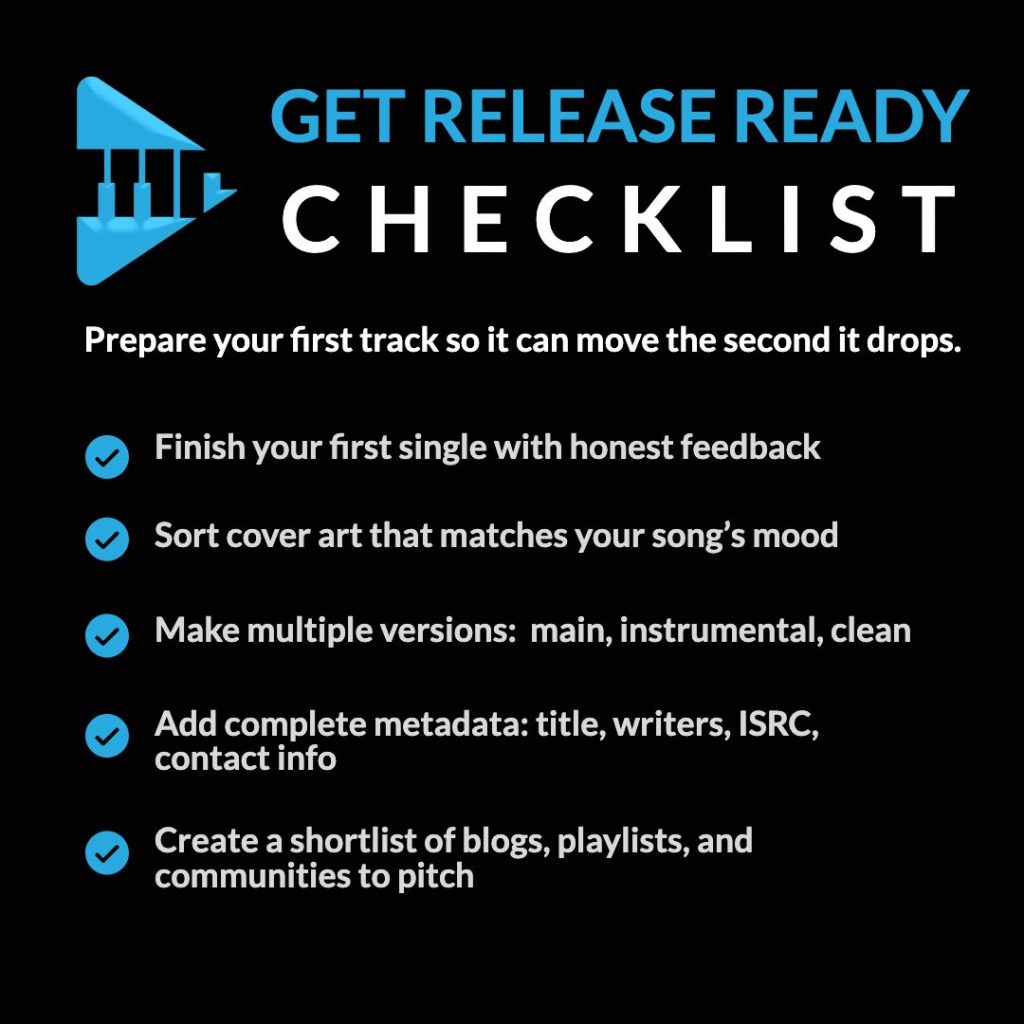
Week 9-12: Launch and Promote
Now you bring your music to the right listeners, not just any listeners.
Release and announce
Get your single out. Email your list. Post to your socials. Share it with one or two outlets that might actually care.
Build credibility
A niche playlist or smaller blog where your sound belongs is worth more than a big one that ignores your style.
Go where the listeners are now
TikTok, Instagram, and the right Reddit threads can put more people in front of your music in a single post than a month of blog features. It does not have to be perfect. A clip from rehearsal or a short story about where the song came from will connect faster than a polished ad.
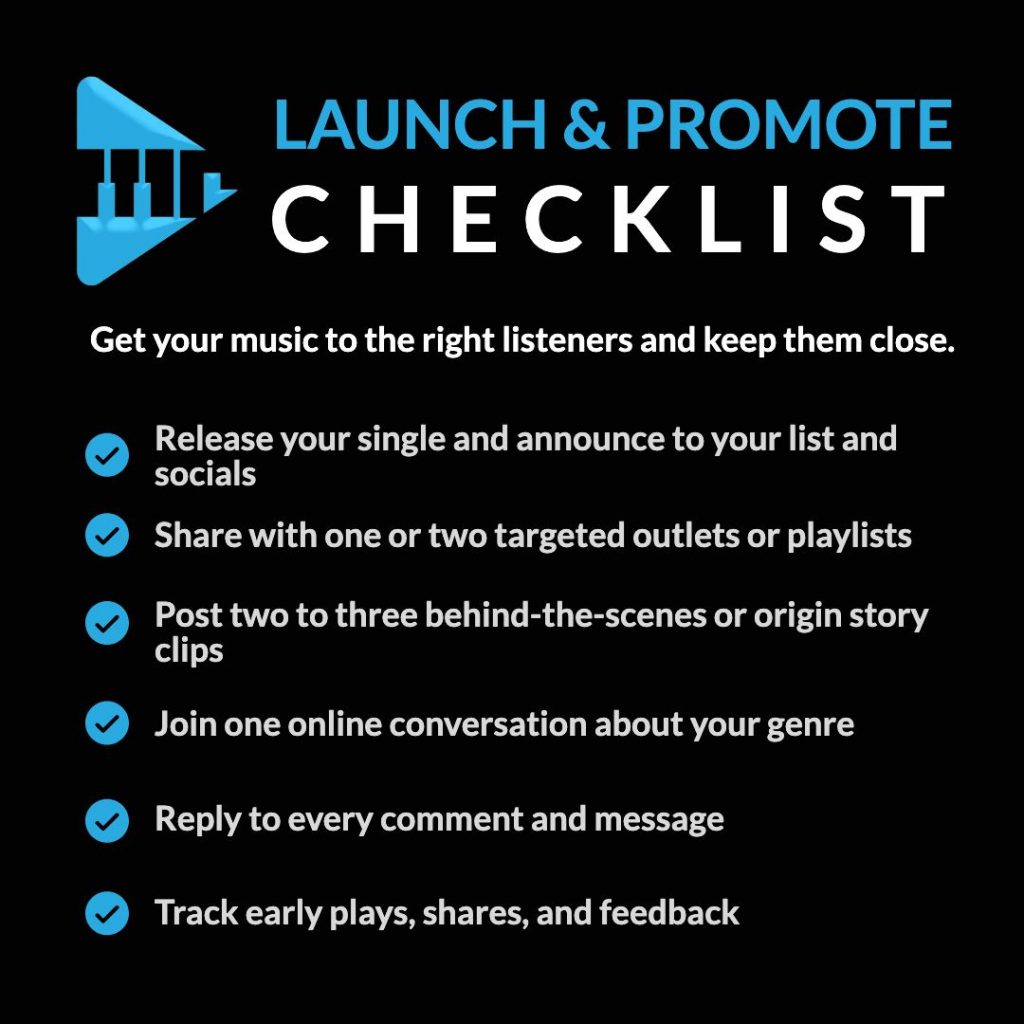
Save this checklist for your own 90-day plan
First Press, Playlists, and Modern Outreach
Once you have your first release, you need ears on it. Not just anyone’s ears either. Think about where people who might actually like your music spend time.
That might be a small indie blog that covers your genre or a playlist run by someone who actually listens before they add a track. Those are worth finding. A single mention in the right place can give you something solid to show venues or promoters later.
But here is the thing. Blogs on their own won’t get you far anymore. Most people find new music while they’re scrolling TikTok, Instagram, or even Reddit. Hardly anyone is sitting down to read long reviews these days.
Where Your First Fans Might Be:
- TikTok clips with your hook or chorus
- A quick story on Instagram about making the song
- A relevant Reddit thread where you join the conversation
- Smaller blogs or playlists that care about your style
When you reach out, whether it is to a blog, a playlist, or a social audience, sound like a human. Skip the stiff, press-release tone and share a bit of yourself. – Remember that imperfection we mentioned earlier? It resonates.
A moment from rehearsal. A story about how the song came together. Those little glimpses are what make people remember you.
Sync-Readiness Checklist
Landing your song in a film or TV scene sounds glamorous. But the song itself is only half the job. The other half is making sure it is ready for someone to use the second they hear it.
Here is what to keep ready:
- High-quality audio files in both WAV and MP3, mastered and good to go.
- Instrumental version for moments when vocals will not work.
- Clean edit so you can still land placements if your original has swearing.
- Lyrics sheet typed up and easy to read.
- Metadata with your song title, writer names, contact info, and any credits.
- Ownership clarity so you can say exactly who owns the master and the publishing.
Melody Rights can hold all of this for you, keep it organised, and deliver it the moment a sync chance appears. If you want more detail on how to prep for sync, read our guide to submitting music for film and TV.
Avoid These First-Year Mistakes
Plenty of new artists trip up in their first year. Most of it comes from rushing or not knowing what to watch out for. Skip these and you will save yourself a lot of stress:
- Signing a “free” distribution deal that quietly takes a cut of your publishing.
- Dropping music before you have even built an email list of people who might listen.
- Pitching to sync without registering your songs first.
- Skipping metadata, then wondering why you never see the royalties.
Fictional, But Happens All the Time
In 2023, a singer-songwriter uploaded their debut album to a free distributor without reading the fine print. Six months later, a track went viral on TikTok and was pulling in thousands of streams a day. The distributor took 50% of the publishing and locked it for five years. Half the income was gone before the artist even realised what had happened.
Melody Rights can keep you clear of all of this. We help you get registered, track your royalties, and keep control of your rights from the very first release.
Your Next Step in Starting a Music Career
You have the steps now: practice, build your base, get your first release ready, and share it where it matters. You know the traps to avoid in your first year. You’ve also picked up tips for making your songs ready for sync if that’s a road you want to go down.
The effort ahead is no small thing, but neither are the wins. Every time you practice, connect with a listener, or put out a track, you’re adding another brick to the career you’re building.
Melody Rights fits into this from day one. We help you register your music, track your royalties, and keep every song ready for the next stage, whether that is a live gig, a streaming drop, or a film placement.
Start today.
Choose one action: finish a song, register a track, reach out to a playlist. Do something that moves you forward. This is how you start a music career that lasts.
You make the music. We make sure you keep what it earns. Find out more here https://melodyrights.com/how-it-works
Frequently Asked Questions
How do I start a music career with no money?
Plenty of artists start broke.
Use your phone for demos and free DAWs like GarageBand or BandLab to produce. Share short clips on TikTok or Instagram to grow your fanbase early. Upgrade gear bit by bit as you earn. Momentum matters more than a perfect setup.
See our How It Works guide for what to protect first.
What does becoming a musician look like in 2025?
You still write and perform, but you also protect your rights, track royalties, and grow multiple income streams- sync, merch, teaching, gigs, and direct-to-fan sales. The ones who thrive treat music as both art and business. See our guide to 4 Types of Music Royalties.
Do I have to sign a record deal to have a music career?
No. Many stay independent, keep their rights, self-release, and build audiences directly. Labels can help with funding and reach, but cost control and royalties. Melody Rights lets you manage royalties, register songs, and protect your work while staying independent.
What’s involved in getting my track “sync-ready”?
Make sure a music supervisor can use it instantly: main mix, instrumental, clean edit, lyrics, complete metadata, and high-quality audio in multiple formats. Without that, you risk losing placements. See our sync guide.
When should I build a team around my music?
When admin, promo, and bookings start cutting into your creative time. If gigs, PR requests, or income are steady but overwhelming, a manager, booking agent, or sync rep can help. Get your foundation- song registrations, royalty tracking, and distribution- set first.

